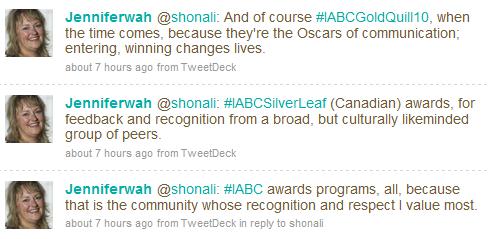 Seems a day doesn’t go by that I don’t get flooded with invitations to enter award programs, and I’ll bet you suffer the same onslaught. Is it just me, or are there more awards programs, more invitations and more deadlines to deal with these days? Not to mention the fees.
Seems a day doesn’t go by that I don’t get flooded with invitations to enter award programs, and I’ll bet you suffer the same onslaught. Is it just me, or are there more awards programs, more invitations and more deadlines to deal with these days? Not to mention the fees.
Ribbing aside, each of us has their favorite awards programs – or the ones they’d be thrilled to win. I was curious about this, so I posed the question to communicators (on Twitter, of course), and here’s what I got:

Sean Williams said it was the Institute for Public Relations’ “Golden Ruler” as did Katie Paine (who’s a founding member of IPR’s Measurement Commission; (SNCR, PRWeek and PRNews‘ awards also ranked on Katie’s list). Here are a couple more responses:



Brenda Drake (@brenleigh) elaborated further via email:
“… Ideally, school PR professionals would be members of NSPRA and PRSA to stay abreast of the latest advances in the public relations profession both inside and outside of school divisions. There is so much we, as school divisions, can learn from other companies and organizations but if I had to choose, I would recommend NSPRA before PRSA because it specifically deals with the challenges that PR professionals face in the public school environment – bond issues, volunteers, changes in school policy, confidentiality issues related to students and personnel, working with city council/board of supervisors, etc.
I’d like to point out that I don’t believe school PR is more difficult than working for another organization. I do believe that there are specific differences between school public relations and other fields that support the cause for the NSPRA organization. To further support the cause of niche-specific award programs, the fee for entering the NSPRA awards program is significantly less than other programs ($68-$90 per entry vs $260 per entry for PR News awards program).”
Peer recognition is a major factor, which is why IABC’s awards mean a lot to me (I haven’t as yet won any); and since I get my “jollies” from research and measurement, receiving a Golden Ruler Certificate of Merit together with Katie last year was a major high.
So here’s my personal plug for both of them: for all you research and measurement fiends, the Golden Ruler entry deadline is August 15; and while the 2010 Gold Quills are yet to be announced, IABC/Washington (disclosure, I’m president-elect) is accepting entries from communicators in the DC Metro area for the 2009 Silver Inkwell awards until July 31 August 15 as well (update).
Winning Tips
Entering your favorite awards program is all very well, but what we really want is to win. Here are some tips:
From Debbie Friez: Have actionable goals which can be evaluated, and actually do the analysis. Also, follow all the instructions!
From Leigh Fazzina: Sit on a panel and “judge” to see how many entries fail the submission criteria and do not follow entry instructions. Then one will know exactly “how” to enter. (I’ve done this, and I highly recommend it).
From Jennifer Wall Smith: Give yourself more time than you think you’ll need. Award entries are notorious time hogs.
A last word:

What’s your favorite awards program and why? I’d love to hear your opinion.
And finally – to all those entering their chosen awards program – may the force be with you.
Many thanks to all who responded, and not just on Twitter; you helped me put this post together. You’re all winners in my book.
![[EVENT]: PR Hacks for Small Biz (online)](https://shonaliburke.com/wp-content/uploads/2021/06/FB-Ad-1200x800-01-01-01-Copy-500x383.jpeg)








Thank you ALL for your comments, especially Judy & Heather, for providing such thought-provoking ones.
The “cash cow” question is a valid one, Judy. I honestly don’t know the “right” answer to that. We do charge for Silver Inkwell at IABC/Washington, as do most programs – as Mary mentioned, WWPR’s Woman of the Year is one of the few “free” programs I know of in the DC area, but it’s also a different animal. While it’s great when awards programs bring in revenue, to me that enables us to provide other, sometimes free, services to our members and offer other professional development offerings at a reasonable cost to them. Even as a non-profit organization, we do have costs, such as administration, event costs etc., and we need to be able to cover those.
The members only point is a really interesting one. Wouldn’t that turn the world on its head?!
Mary & Heather, again speaking of IABC/Washington, we do display the winning entries. Speaking of excellence, Heather, that’s a really good point. I know there have been times we haven’t given an SI award because the submissions just weren’t good enough. And I completely agree with you about them being models in terms of objectives & evaluation. I’ve been shocked at some of the award submissions I’ve judged in other programs that don’t have either.
Thank you all again for contributing to the conversation!
The thing that normally disappoints me with awards is that few of the winning campaigns or organisations are subsequently available as “case studies” that can be studied by students or reflected upon by practitioners.
If these programmes are supposed to highlight the best of the best, then they should be available via websites etc in such a format that the key aspects – plus judging views – can be reviewed.
At the least, they should be role models in terms of having robust objectives and demonstrating real evaluation.
Regarding bestowing awards rather than a pay-to-maybe-win contest, I was interested to discover when reading the Acknowledgement section of Ruth Reichl’s newest memoir, Not Becoming My Mother: And Other Things She Taught Me Along the Way (2009), that Reichl was inspired to write this fourth memoir because of the speech she wrote/gave, after being awarded the 2008 Matrix Award for Magazines from New York Women in Communications, Inc.
That’s a pretty powerful outcome from an award determined on merit.
Thanks, Leigh. So shall I put you down for a judging slot for IABC/Washington Silver Inkwell?! ;-)
Shonali, great topic and very good post. I hope a number of people read this because it is all SPOT ON.
Michael, thank you for the applause.
My biggest piece of advice, as you posted above, is to judge. I have been a Sr. Judge of the PRSA Bronze Anvils for about 5 years. I have also judged the IABC Awards as well. Judging allows one to learn and see what make for a winning entry, a mediocre entry and weak entry. It allows you to see what to do and what not do. It also allows you to see what doesn’t get passed though and how quickly entry will be disqualified if the directions are not followed properly. Judging is a very big learning experience and it will definitely help one create a great submission.
I cannot even begin to tell you how many entries my judging panels have disqualified (DQd) over the years for PRSA Bronze Anvil entries. This year we judged one category (which will remain nameless), and out of 28 entries submitted, 25 were DQd. Yes, 25 were DQd! Believe it! My judging team members and I were shocked. Most of us were shocked because these submissions were coming from not only PR agencies, but top worldwide PR agencies! I couldn’t even believe some of the entries had made it out the door and into the mail. Many of them didn’t follow instructions, and many still were getting “objectives” confused with “goals.”
As soon as I started judging several years back I shortly after started entering my first round of award entries. And due to the great work my corporate team and I completed, and to a strong entry I put together, we began winning a number of awards – one right after another. I have to say I felt like I had the submission process down pat and to perfection since I had been a judge. I knew exactly what was needed and what to do and what not to do. If I worked for an agency, I would have taken this experience I gained and started an awards committee; creating a group that is responsible for all awards submission. I know some agencies do this as part of their corporate communications and having been a judge I can tell you this is the best idea around. This allows one department to control all award entries and go through the submission process with a fine tooth comb.
I continue to judge, even after all these years. Why? Because categories change and criteria changes, and I want to stay ahead so my colleagues and I can benefit.
PRSA is always looking for Bronze Anvil Judges each year. You can contact Karla Voth at PRSA to get involved. I recommend that if you start judging to do so with some of the smaller industry awards. I don’t recommend going right after the Oscars…. Although that could certainly be an experience in itself!
Good luck to all! May you all be winners!
Awards programs are definitely seen as a revenue stream for most organizations, to varying degrees. For some, it’s a side benefit, and for others, it’s the primary reason.
Some examples I like:
I love how WWPR charges no fee for entries for their PR Woman of the Year award. That’s unique.
DC’s Ad Club charges, but I like how they outsource their judging to out-of-state judges. I think that keeps it fair. Another thing they do right for their Addy’s: on awards night, they display the winning entries and there is a presentation, as well as a program. So when you pay your ticket to attend the gala, you actually walk away learning something about the companies that won! You understand why the awards were considered most excellent in their category. I feel awards ceremonies should be inspirational in this way.
I was disappointed in the AMA-DC and PRSA-NCC Thoth Awards, as were some other attendees. At least Thoth was fun. But in my opinion, there should be more display of the winning entries. If they announce an award for a campaign, at least show a slide. Have a program. I know time is always a challenge at these functions but there should be some way to educate the community about excellence in the field, and we don’t learn much just by hearing a bunch of names rattled off.
In my usual fashion, I’d like to throw out some things to think about regarding awards programs (especially association-based ones).
1. Should(n’t) entries be limited to members only? After all, if the awards program is worth entering, isn’t the association worth becoming a member of? (I’m having an ongoing discussion with a colleague in another country/PR association about this. We haven’t come to a resolution as yet.)
2. Do administrators of these programs view them too much as a cash cow? With far too many organizations (almost all of them), I get the distinct feeling that the revenue stream is the *primary* purpose and the highlighting of excellence is secondary.
If it wasn’t, wouldn’t it be really inexpensive (or free) to enter…in particular if the awards programs were limited to members only?
Just sayin’….
Great post, and thanks for the mention. As a former PRSA-NCC Thoth Awards co-chair, I really like the last word.
Great collage of thoughts on the topic, Shonali!
Totally echo Michael’s points, above, and wanted to add a few more:
– For awards programs that celebrate the best in the world (not just your region or country), make sure – as an entrant – you spell out any relevant cultural differences that a judge might not otherwise understand. This includes acronyms!
– Cannot underscore enough the value of judging experience on entering. It’s the perfect not-so-secret insight into what the judges are looking for. Sign up now, sign up often. One of the best ROIs on your volunteer time, especially when you win!
– Think like a winner! Begin to use the approach to awards entries (the IABC model, in particular, which asks for you to define the need/opportunity, audience, goals & objectives, implementation and measurement)… Go into every project, every discussion, with this framework in mind and you will already be a winner in terms of thinking like a high-level strategic communicator! The hardware will follow… :) (And eventually, the best “recognition” of all – your Accredited Business Communicator – ABC – designation.
– A few shameless plugs for readers (hope it’s okay, Shonali!)
If you’ve never judged before (or if you’re a veteran), lobby your IABC chapter to start an Awards Judging Training Program. My chapter (IABC/BC) has one and it’s a great way to get insight into the process.
And watch for the Gold Quill Call for Entries around October… But start planning now!
Hear, hear, Debbie, Leigh, and Jennifer…especially Leigh’s suggestion to judge (disclosure, I’m heading up judging for IABC/Washington’s Silver Inkwell and could definitely use judges).
Here’s a few more tips:
Define your audience well. What about them led you to the approach you took? Don’t just say you sent your brochure to the three zip codes around your business. Tell me something about the demographics of those zip codes aside from proximity that means something to your business and your project or campaign. If you’re a hospital, are you surrounded by a farming community with lots of pesticide-related illnesses or farming related injuries, or a coal mining community with lots of black lung?
Tie your campaign or project objectives back to the overall objectives of the business or organization. Tell me how your campaign will help your business sell it’s widgets.
Tie your results measurements and evaluation directly back to your stated objectives. Telling me the “Board really liked the brochure and said it was the best they ever had” isn’t measurement. It’s a nice anecdote, sure. Include it, but show me how that brochure sold widgets. How many? If you didn’t have the time or budget to do results measurement the way you would have liked, or the campaign hasn’t ended yet, tell me how you intend to measure or would have if you’d had the time or budget. I’ll give you credit for showing me the thought process.
Best of luck to you all if you’re submitting! Contact me if you’d like to judge at michael_clendenin@cox.net.
Great post, Shonali!
Good read! I love the star wars theme ;)